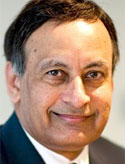Pakistan Must Visualise Itself as a Pragmatic Territorial State While Focusing On Security of Its People

By Husain Haqqani
March 16, 2015
After last year’s attack on a Peshawar school, where 160 people including schoolchildren were massacred by Taliban, Pakistan announced a major shift in its policy towards terrorists. Civilian and military leaders simultaneously spoke of no longer distinguishing between ‘good’ and ‘bad’ Taliban. But three months later, it’s clear that distinctions remain between Jihadi groups perceived as useful in establishing external influence and ones that now threaten the internal security.
That, distinctions still exists between terrorists who attack abroad and those who strike at home was confirmed by the Islamabad High Court’s decision to set free Zaki ur Rehman Lakhvi, the mastermind of the 26/11. Although the Pakistan government moved to continue Lakhvi’s detention, the court’s argument for setting him free was disingenuous. According to the High Court, evidence collected by India against Lakhvi could not be used to describe him as terrorist.
For decades, Pakistan’s establishment has argued that one man’s terrorist is another’s freedom fighter. The argument was framed primarily to favour Jihadis trained to fight in Kashmir. Former military dictator, General Pervez Musharraf, admitted his government’s support for Afghan Taliban after 9/11 in a recent interview with the Guardian. He justified it on grounds of protecting Pakistan’s national interest in Afghanistan against India.
Ironically, Musharraf’s admission of support for the Afghan Taliban even after 9/11 came after years of denial. By his new account, Pakistan received billions of dollars in US aid to help fight the Taliban while using those resources to help the Taliban fight (and kill) American and NATO troops in Afghanistan. By Musharraf’s logic, Pakistan’s contest with India for influence over Afghanistan justified the blatant hypocrisy.
There is an ideological obsession with India that serves as the overarching framework for Pakistan’s foreign and domestic policies. It is manifested in Musharraf’s argument that helping the Afghan Taliban against Pakistan’s ostensible ally and benefactor, the US, was needed to contain India’s growing regional influence.
It is also visible in the reasoning of a Pakistani High Court that evidence against an international terrorist (Lakhvi) should not be admitted because it was collected by India. How can Pakistan trust India, the argument goes and in any case someone who attacked India could not be deemed as evil as other terrorists? Terrorism has cast a long shadow on India-Pakistan relations since 1989 and also jeopardises Pakistan’s relations with the West. But Pakistan’s establishment refuses to completely give up the option of sub-conventional warfare, which it sees as a force multiplier and influence enhancer.
There is no evidence that the fundamental thinking has changed in Islamabad (the Pakistani capital) or Rawalpindi (the location of Pakistan’s military headquarters).
It’s true that the Peshawar attack has prompted Pakistan’s military to speed up action against terrorist groups responsible for mayhem inside the country. The military’s ‘Operation Zarb-e-Azb’ has destroyed the Tehrik-e-Taliban Pakistan (TTP) safe haven in North Waziristan, which has also disrupted some external Jihadi groups that shared that safe haven. But ISI is still trying hard to persuade the US and Afghan governments to talk to its strategic assets, the Afghan Taliban led by Mullah Omar and the Haqqani Network.
Destruction, demobilisation, disarmament of these Afghan groups is clearly not the Pakistani state’s agenda. There has been no move whatsoever against Kashmir-oriented Jihadi groups. The recent Para-military operation against the secular Muttahida Qaumi Movement (MQM), Pakistan’s fourth largest political party that controls Karachi, also reflects the military’s entrenched attitude on the issue of terrorism.
The Punjabi-dominated army has never liked the MQM, which is seen as opposing the ideology of Pakistan and speaking of the country as a federation of ethnicities rather than a citadel of Islam. Little seems to have changed since the 1990s, when Jihadi groups were nurtured by Pakistan for Afghanistan and Kashmir. Instead of going after the TTP or other Jihadi groups operating out of Karachi, the army is content to repeat its previous exercise of reducing the clout of a partially armed urban political movement representing the Muhajir ethnic group.
The tolerance and support of militancy has made Pakistan a soft state but that does not deter the civil-military establishment from persisting with the old paradigm. Securing Kashmir, balancing India and dominating Afghanistan are Pakistan’s ideological obsession even though pragmatic considerations necessitate a course correction.
It seems that changing Pakistan’s discourse is a prerequisite for changing its course. Pakistan views itself as an ideological state in a state of permanent conflict with India. Someone must now lead Pakistan into visualising itself as a pragmatic territorial state that focuses on the security and prosperity of its people.
Husain Haqqani is former Ambassador of Pakistan to the US
Source: http://blogs.economictimes.indiatimes.com/et-commentary/pakistan-must-visualise-itself-as-a-pragmatic-territorial-state

No comments:
Post a Comment